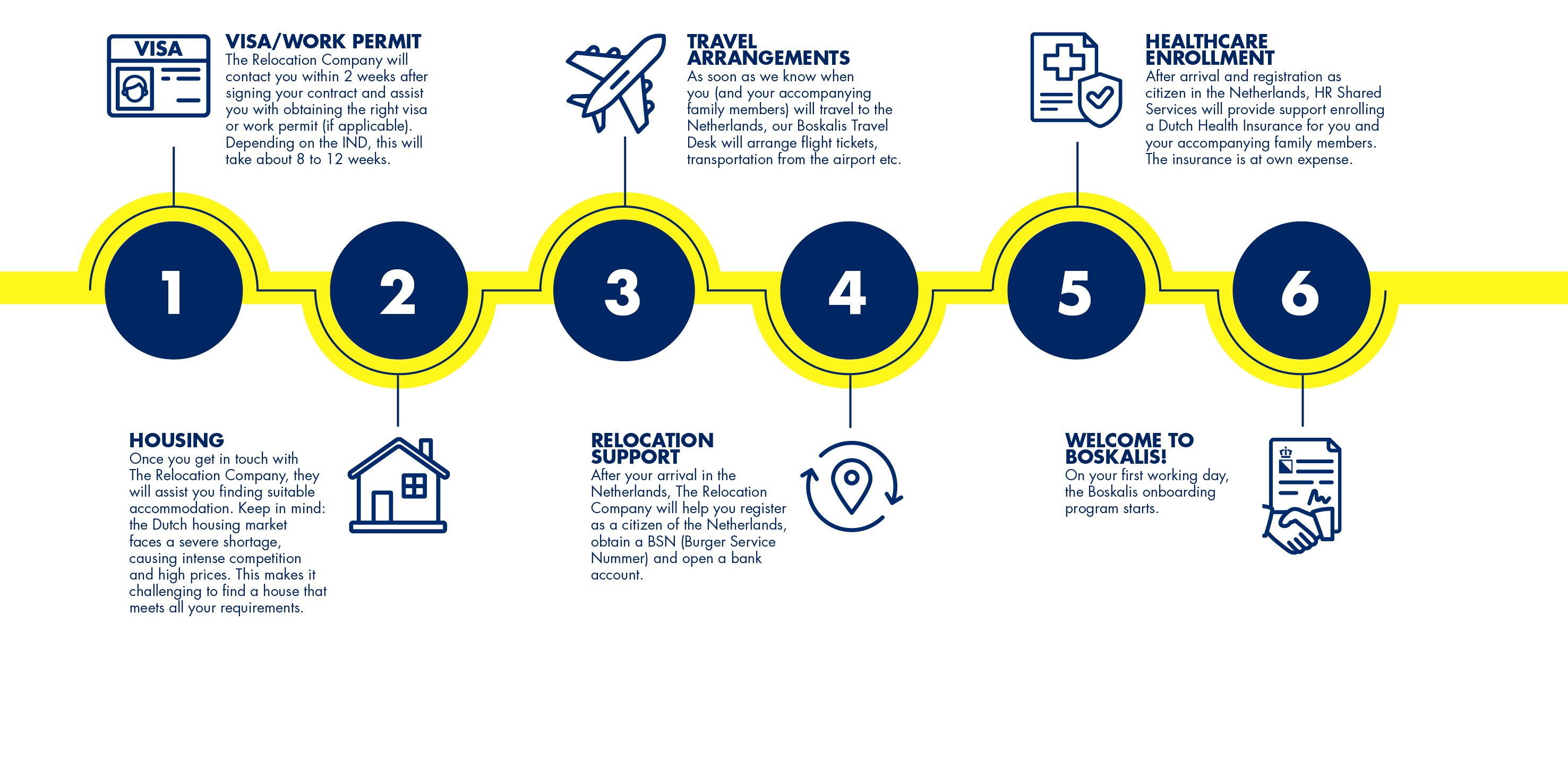WICHER EN MELANIE MAKE THEIR MARK AT THE TENDER DEPARTMENT (DUTCH)
ShowPlease be aware of fraudulent job offers from individuals claiming to represent Boskalis. Boskalis will never ask you for payment or bank details during the recruitment process. If you are asked to pay for a job, visa or other documents, please treat it as fraudulent and ignore the message.
This “living and working guide” has been developed for expats/relocators who are going to work and live in the Netherlands. The guide contains detailed information about living and working in the Netherlands to assist with your relocation and facilitate a smooth introduction to the business here, which will accelerate your success in your new role. Transferring overseas with Boskalis, provides you with an amazing opportunity to advance your career rapidly, enjoy a lifestyle change and experience a new culture. We hope that this guide will help you be well prepared so there won’t be any surprises upon your arrival.
Why live and work in the Netherlands?
The high standard of living, excellent infrastructure and stable economy make Holland very attractive to the global workforce. Holland has one of Europe's most extensive and generous social welfare systems. The crime rate is low and most Dutch people can speak English. Although the Netherlands is one of the world’s smallest countries in geographical terms, it is a highly prosperous country that has one of the strongest economies in the world. Its economic success has been built largely on foreign trade and the country’s role as a transportation hub, with Rotterdam being Europe’s largest seaport and Schiphol being the third-largest airport in Europe. Economic stability, a highly skilled labor force, a reputation for efficiency and an advanced and sophisticated transport and communications infrastructure have made the Netherlands very attractive to multinational firms and foreign investors alike. Many companies have their headquarters here.


The Dutch healthcare system is known as one of the best in the world. If you work in The Netherlands, you are required to apply for basic health insurance (even if you have a part-time job or paid internship). From the moment you have a Citizen Service Number (in Dutch: Burger Service Nummer - BSN), you have four months to apply for health insurance in the Netherlands. You risk a fine if you wait too long. The basic insurance plan is already quite extensive and is more or less equal for all h...
Read moreWhen you move to the Netherlands, you will need to open a Dutch bank account to receive your salary, rent an apartment or just to pay for your groceries at the supermarket. To open a private bank account in the Netherlands, you will need to either make an online appointment or simply walk into your nearest branch with all of your details. To open a bank account in the Netherlands you will need the following: Your Citizen Service Number (In Dutch: Burger Service Numme...
Read moreOf all Europeans, Dutch residents face the longest daily commute. No less than 30 percent of workers in the Netherlands spend 45 minutes or more on the road or public transport between home and work. Public transport and OV chipcard The most convenient way to use all sorts of public transport (train, bus, tram and metro), is by owning the so-called OV chipcard. Here you can find detailed information regarding what OV chipcard is and what types...
Read moreWhen you travel to the office or you need to travel for business purposes, you are entitled to an allowance from Boskalis. For more detailed information about the commuting/travel allowance, check the “Guide to Boskalis” which is published on Bokanet.
The Belastingdienst is the government's tax collection and customs service in the Netherlands. It is part of the Ministry of Finance. Whether you're a Dutch citizen or an expat, you are required to pay taxes when you earn money while living in the Netherlands. The link to the Belastingdienst is the following: www.belastingdienst.nl/wps/wcm/connect/en/individuals/individuals.
One of the most important things to understand about your Dutch salary is the difference between your gross and net salary: Your gross salary (in Dutch: bruto salaris) is the total amount of your salary before tax and other costs are deducted; Your net income (in Dutch: netto salaris) is your salary after income tax, social security payments and contributions for your pension have been deducted. The net salary is the amount that is deposited i...
Read moreIf you are registered in a municipality in the Netherlands, you obtain a Citizen Service Number (Burger Service Nummer – BSN). A citizen service number is a unique number for anyone in respect of matters related to the Dutch government authorities. The BSN will facilitate any interaction with the Dutch authorities: starting a job, opening a bank account, deducting your taxes and social security contributions, using the healthcare system, applying for possible benefits, announcing a change...
Read moreIn the Netherlands, you can easily travel by train, bus, bike, tram or even by taxi. Therefore, you can easily arrange day trips or vacations among the many beautiful places that are worth seeing without having to worry about transportation. Here you can find some inspiration for beautiful cities and villages to put on your must-visit list.
Expats from within the EU, the EEA (the EU plus Iceland, Lichtenstein and Norway) or Switzerland do not need a work or residence permit for the Netherlands, as citizens of these nations have the right to freedom of movement within each other's countries. Every non-EU citizen who wants to work in the Netherlands has to obtain a valid work permit. A work permit is valid only for the employer who makes the request and ceases if/when the employee leaves the job. There is no gener...
Read moreWhen you bring your family members with you, they will receive a residence/work permit as a “family member”. This makes it possible for them to stay/work in the Netherlands. In case you want to bring your family to the Netherlands, please discuss this with your HR manager and make sure that a permit is applied for them as well.
Education is compulsory in the Netherlands from the age of five to sixteen, however, most children start to attend primary school at age of four. While the structure of primary education in the Netherlands is straightforward, the structure of the Dutch secondary education system often seems confusing because of the multiple paths and graduation ages in high school. In reality, Dutch secondary schools are similar to those in most other countries, with one stream to prepare students for vocational...
Read more
Commuting around the country by bicycle is ingrained in Dutch culture and you won’t have any worries about cycling alongside the road. Almost every inch of the country has some sort of bike lane which explains why cycling is among the most widespread modes of transportation in the Netherlands. However, there are some important and curious laws you should know about cycling in the Netherlands.

Even though most Dutch people speak perfect English, you can embrace the country even better by picking up some Dutch lessons. Boskalis offers numerous trainings and room for growth to its employees in various topics, including Dutch courses.


We all know that the Netherlands is famous for its rainy days. However, what makes this country different is how drastically the weather can change in half an hour or even a few minutes. At one moment you might be enjoying the bright sun, and the next moment it’s already pouring cats and dogs. Therefore, looking at the weather forecasts in the morning may not be concrete enough to predict the day. The app “Buienradar” is measures very accurately how fast the clouds are moving and can predict when it will start raining. Note that the website works most accurately with short-term predictions.
It is good to know that in many shops or restaurants, the only possible way to pay is by card. What’s more, Visa is not as widely accepted as MasterCard in the Netherlands. Therefore, it is advised that you open a Dutch bank account as soon as you arrive here.

